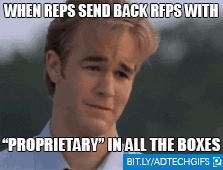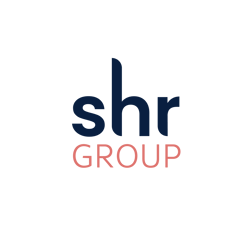Contributed by Paula Perrin, Sr. Market Analyst, SHR
 You just got back from HITEC (or ROC or ITB) and you’re all fired up about some amazing new hotel tech you saw at the show. You can’t wait to get back home and dust off your trusty RFP template, full of standard hotel tech questions that have served you well in the past. But just how past is past? A solid RFP process is indispensable in cutting through the noise and any preconceived fears and notions of hotel technology. With fiscal 2020 just around the corner, and experts recommending RFP contents be reviewed at least every two years, most hoteliers are long overdue for some RFP updating.
You just got back from HITEC (or ROC or ITB) and you’re all fired up about some amazing new hotel tech you saw at the show. You can’t wait to get back home and dust off your trusty RFP template, full of standard hotel tech questions that have served you well in the past. But just how past is past? A solid RFP process is indispensable in cutting through the noise and any preconceived fears and notions of hotel technology. With fiscal 2020 just around the corner, and experts recommending RFP contents be reviewed at least every two years, most hoteliers are long overdue for some RFP updating.
But before you can figure out the right questions to ask any potential tech vendor, you have to ask yourself, and your hotel team, the right questions. The following three get to the core of what holds many hoteliers back from their best RFP. Answering them honestly can help not only reveal what matters most to your business, but also ensure that the vendor you choose can deliver on your expectations—and keep “proprietary” to a minimum!
Is Our Past Our Future?
Back to that dust we were talking about before. We are all creatures of habit, and that applies to how we deal with RFPs as well. But what’s worked in the past may not work in the future, or even the present. Though it’s common to seek out new hotel tech systems based solely on your current system’s features, there is a better way. Gather your departments, sit down with them, and ask “Who are we now, and who will we be in the future?” We’re talking about brand here. Maybe you were “the low-key retreat” ten years ago, but now you are dealing with a much younger and more active clientele who are looking for unique and authentic experiences, requiring more system mobility than you have now? Once you reach an answer as to your future audience and what you are trying to provide, only then can you lay out detailed tech requirements per department. This will prevent you from mistakenly keeping current procedures you don’t need anymore, then not understanding why your new tech system is not functioning properly. Design your RFP with your requirements for the future in mind, then go one more step and include requested features sorted by priorities. Purchasing software is an investment for the future and should be treated as such.
What’s Our Five-Year Plan?
An old favorite of hiring managers, this question is a very smart one to ask once you have your brand identity secured. This is because true system costs need to calculated not just for the first year, but also for the following years. Experts recommend looking at a total cost for at least five years forward, including all interfaces. This means going way beyond what you may see on the front end of any vendor RFP. For instance, are there any costs for system updates? With the average high turnover in hospitality staff, will your proposed vendor include training new employees, or not? Will newly added features be available free of charge as they come out? There have been more than a few hoteliers who have been promised that new system software could interface just fine with one of their current systems, only to find out down the line that their interface in question was no longer supported. (More on this later.)
Are We Seeing the Whole Cost Picture?
Once you have the majority of your five-year plan hashed out (congratulations!) it will be easier to look at vendor offerings and see what fits you and what doesn’t. Unfortunately, when it comes to cost, there is a real lack of transparency among most vendors, so you’re going to have to be proactive and make your needs known by asking the right questions in your RFP. In addition to the documented hard costs from the vendor and your own internal costs, here are the ones that come up the most.
- Onboarding is noted by the majority of hoteliers as the number one reason they do not seek out new hotel tech even if what they have is not working. Also known as implementations, fully understanding this initial step is not something you want to neglect. Ask exactly what you will be getting, from whom (dedicated team?), for how long, and for how much.
- Support is something that often gets put aside and forgotten about, but once you are onboarded, you need to know if you will have a dedicated person/people, how much of your time will be required, what response time is, and how much downtime you may be looking at. Remember, no one absorbs the cost of poor support but the hotel business itself. When you are six months into a three-year contract is not the time to find out that support is extra—or lacking.
- Integrations, or more exactly, how much will your vendor charge you every time you want to integrate a new system? How long will it take if the integration is not already developed, and how will that impact the ROI you are budgeting for from your investment? For example, say you invested in a well-known guest review system on the promise from your proposed vendor that it already interfaced to your equally well-known PMS. You don’t want to find out down the road that the interface in question is no longer supported, and you’re left high and dry, losing any tangible benefit for that time period.
That’s it! If you can answer those three big questions, your RFP template should be more relevant, and your process should run much smoother. But remember, the bottom line to your best RFP experience is even simpler; never be afraid to question yourself, your business goals, or your vendors. The old adage of “there are no stupid questions except the ones that don’t get asked” applies to the RFP process now more than ever. So be involved, be aware, and dig into the process as you enjoy your journey to a fresh and hopefully more bankable RFP experience.
BONUS! Download your free, customizable RFP Template now, courtesy of SHR!



